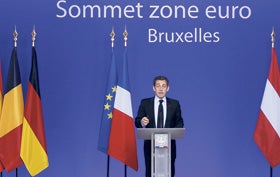Markets breathe sign of relief as eurozone forges new rescue plan

Global financial markets welcomed the deal agreed by eurozone leaders in Brussels designed to prevent the disintegration of the single currency. But some investors cautioned that the ultimate success or failure of the agreement, struck early yesterday morning after more than eight hours of negotiations, will depend on crucial details still to be revealed.
Stock markets across Europe rose sharply in the wake of the agreement by the heads of the 17 eurozone governments to write down the value of Greek debt by 50 per cent, recapitalise the Continent's banks and increase the resources of the European bailout fund, known as the EFSF. The euro reached a seven-week high against the dollar.
The President of the European Commission, Jose Manuel Barroso, told the European Parliament in Strasbourg that Europe is "closer to resolving its economic crisis and to getting back on a path of growth".
But some prominent investors said that significantly more detail was needed before policymakers could legitimately call a turning point in the emergency. Mohamed El-Erian, the CEO of Pimco, the world's largest bond fund, said: "How will the EFSF be leveraged? Where will money for the capital [for banks] come from? What will taxpayers be required to pay?"
The agreement on the 50 per cent write-down of Greek debt was struck between the eurozone and the global banking umbrella group, the Institute for International Finance (the IIF). But the IIF confirmed yesterday that it does not speak for all the holders of Greek bonds.
There was only a vague outline of how the strength of the European bailout fund will be enhanced. The summit statement said that this would be done by offering investors insurance to hold new bonds by troubled eurozone members and "with a combination of resources from private and public financial institutions".
Another area where the summit text is unclear is over the role of the IMF. British officials said they would not be prepared to countenance the IMF putting in any significant new money into the eurozone.
Join our commenting forum
Join thought-provoking conversations, follow other Independent readers and see their replies
Comments
Bookmark popover
Removed from bookmarks